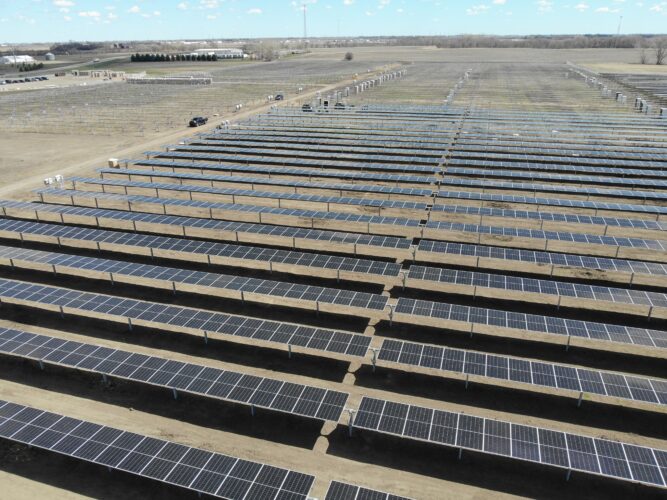Marshall’s 10-Megawatt Solar Farm Nears Completion

The construction of a 10-megawatt solar farm in Marshall city limits is on its way to completion, according to Marshall Municipal Utilities General Manager David Schelkoph. The solar farm, which will provide power to the city, is scheduled to become operational this fall.
Work on the solar farm began in 2023. It covers approximately 50 acres of land near North Seventh Street and Lyon County Road 33. Thousands of solar panels have already been installed, and power inverters are currently being set up to convert solar energy from DC to AC power.
Despite slight delays in the delivery of materials, the solar farm’s construction has progressed mainly on schedule. The project, with a budget of around $40 million, includes the cost of lithium-ion batteries, which will store electricity generated by the solar panels during periods without sunlight. About $25 million of the total project cost is allocated to these batteries.
The solar farm is a project of the Missouri River Energy Services (MRES), one of two major electricity providers for Marshall Municipal Utilities. The other provider is the Western Area Power Administration (WAPA), responsible for the operation of hydroelectric dams on the Missouri River system.
Marshall draws about 25% of its energy needs from hydroelectric power from WAPA, with the remaining 75% supplied by MRES. The city of Marshall is the largest member of MRES, consuming about 12% of their total load, making it a suitable location for the solar farm due to its significant energy demand.
The solar farm, composed of just under 21,500 solar panels, will require maintenance over time to ensure their efficiency. MRES will handle the maintenance under a contract with MMU. The panels, which are designed to track the sun’s movement, have a lifespan of about 20 to 25 years.
The entire electricity output of the Marshall solar farm will be used within the city. The Archer Daniel Midland plant in Marshall is set to significantly benefit from this renewable energy source.
The inclusion of battery storage in the Marshall solar farm will play a significant role in maintaining a balanced and reliable power grid. Schelkoph emphasized the necessity of investing in energy storage to ensure the effective use of renewable energy sources, such as solar and wind, even when conditions are not ideal.
Original Story at www.marshallindependent.com
